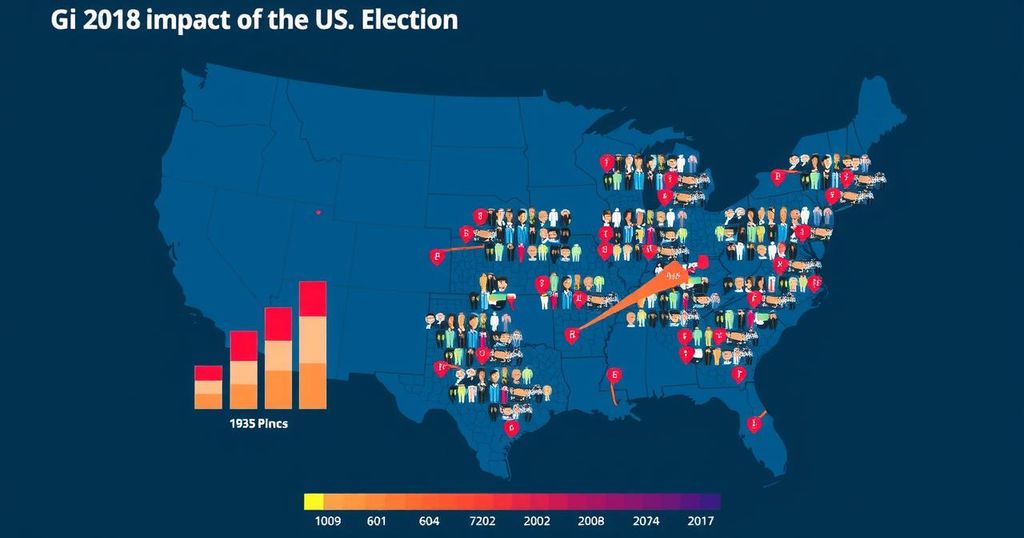The U.S. presidential election will critically impact global affairs, influencing policies on the Israel-Palestinian conflict, support for Ukraine, relations with China, trade, and climate change, depending on whether Kamala Harris or Donald Trump is elected.
The upcoming U.S. presidential election carries significant implications not just domestically but also for global politics and international relations. Depending on whether Vice President Kamala Harris or former President Donald Trump takes office, the world could witness a shift in American foreign policy that affects issues ranging from Middle Eastern conflicts to climate change and trade regulations. This election reflects not only the divisions within the United States but also deeply resonates with various nations experiencing their own unique challenges and expectations. In Israel, public sentiment leans heavily towards a Trump victory, which could embolden hardline policies against Palestinian statehood, although any U.S. president is unlikely to radically alter the current situation. President Harris may advocate for a dialogue with the Palestinians but would likely maintain military support for Israel. Conversely, Trump’s unpredictable approach could allow Israeli Prime Minister Netanyahu to pursue aggressive policies with less U.S. pressure. The stakes are high for Russia and Ukraine, where Trump’s comments about Ukraine’s role in the invasion may alarm Ukrainians, who fear a quick peace deal favoring Russia. On the other hand, Harris is expected to maintain robust support for Ukraine. Interestingly, President Putin perceives minimal difference between the candidates, as he anticipates reduced commitment from both Trump and Harris compared to Biden. When it comes to China, both candidates are projected to adopt a hawkish stance. Economic officials in Beijing recognize the threat Trump’s tariffs pose to China’s economy, while governmental perspectives see potential benefits in his less rigid approach towards alliances, contrasting with Harris’s strategy of strengthening ties with U.S. allies in the region. European nations view the election as a critical juncture; Trump’s victory could invigorate nationalist movements and complicate transatlantic relations, as he has previously threatened tariffs and expressed skepticism towards NATO. Alternatively, a Harris presidency may continue existing policies but could expect Europe to assume more responsibility for regional security. On the topic of global trade, Trump has openly discussed implementing substantial tariffs that could disrupt international trade and provoke retaliatory measures, negatively impacting global economic conditions. Harris, however, is likely to prioritize strategic tariffs aimed at China, maintaining cautious trade relations. In Africa, perceptions of Trump and Harris vary; while Trump may be seen as a decisive leader, Harris’s African heritage resonates with many, as does her commitment to climate action. Under a potential Trump administration, nations reliant on fossil fuels might embrace a less stringent approach to energy production. For Mexico, the outcome poses challenges, particularly with potential threats of military action from Trump and escalating immigration control under either candidate, complicating the collaboration necessary to manage migration flows. Finally, the climate crisis stands as a significant point of contention. Harris is expected to pursue aggressive climate policies enhancing renewable energy; in contrast, Trump may roll back regulations, undermining U.S. commitments to combat climate change and risking a slowdown in the shift towards sustainable energy sources.
The examination of the forthcoming U.S. presidential election elucidates its extensive ramifications both domestically and globally. This election is pivotal, not merely as a political exercise within the United States but as a decisive moment for countries around the world that are closely intertwined with U.S. actions and policies. The potential elections of either Vice President Kamala Harris or former President Donald Trump are likely to produce contrasting trajectories in international relations, addressing critical issues such as the Israeli-Palestinian conflict, support for Ukraine amid ongoing hostilities with Russia, strategic management of relations with China, and varying approaches to global governance and environmental responsibility.
In conclusion, the U.S. presidential election is a global event that extends its influence far beyond American borders. The choice between Vice President Kamala Harris and former President Donald Trump offers two distinct visions of American foreign policy that resonate with different nations and regions. Key issues such as the Israeli-Palestinian conflict, support for Ukraine, relations with China, trade dynamics, and the overall approach to climate change are poised to undergo significant transformations based on the election results. The consequences of this election will not only dictate the future of U.S. national strategy but will also reverberate across the globe, shaping international relations and impacting the lives of millions.
Original Source: www.nytimes.com







